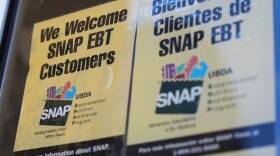We've heard a lot of stories over the years of textile companies shutting down and laying off workers. Here's the story about a textile company expanding.
The performance sock company Feetures has doubled its sales in the last three years, and it broke ground on a bigger distribution warehouse in Catawba County this week. The company is headquartered in Charlotte and employs about 30 people at its current warehouse in Hickory, but plans to double that number.
Feetures was created by a North Carolina family in 2000. Its founder, Hugh Gaither joins WFAE's Lisa Worf to talk about the company's expansion.
Gaither's sons now run the business.
Lisa Worf: A lot of North Carolina's textile jobs were already overseas by 2000. How did features come about at that time?
Hugh Gaither: I grew up in a hosiery manufacturing firm in Newton, North Carolina. It was ladies' hosiery, and it eventually became sports socks. And so that company came to an end. I had to figure out a different path at age 50 and three kids in college. And so I'd enjoyed the sports sock part of the business. I noticed that the sports sock brands that I was familiar with that they seemed to be somewhat stale and we eventually developed a product that was different. The products at the time were thick and bulky, and some of them had two layers. And so we developed a product that was more form fitting and snug and didn't move or slip on the foot. And we launched it in 2002 and it turned out that the running specialty market was gonna go on about a eight-year growth spurt, if you will, and running sort of had a second boom in America. And we took advantage of that.
Worf: Your expansion is this distribution warehouse in Catawba County. You're moving up in size, but do you also manufacture the socks in the region too?
Gaither: We have five manufacturing partners. Two are in North Carolina and three are in Asia. The three in Asia are in Vietnam, South Korea and Taiwan. And the two in North Carolina are in High Point and Burlington.
Worf: Why not all overseas? Would it be cheaper?
Gaither: The actual factory in Taiwan makes some very specialized products for us, so they're not necessarily cheaper, but they just have this very special technology. Probably is fair to say, yes, yes, it would be cheaper. However, think about it, Lisa, our products are actually, relatively in our world, they're expensive. Our basic elite socks retails for $18.00, a pair, so not everybody's gonna buy it. So it better be right.
However, it doesn't make sense in today's world to have everything in one place because, for example, in the pandemic, the factory in Vietnam, which is our largest one still today, it was forced to shut down during the pandemic for 12 weeks so you can imagine that that created some real challenges. So we realized that we needed multiple manufacturing options and the two companies we've located in North Carolina are good partners for us.
There's not that much sock manufacturing in the United States period today. So there's only, you know, a small number of those options or opportunities, but better to have multiple operations in case something happens in one place you're able to be flexible in that regard.
Worf: So then all the socks will go through that distribution center in Newton.
Gaither: That is correct in Hickory now and in Hickory. But yeah, yeah, everything has been going through there and it will continue to go through there.
Worf: As far as distribution, why did you choose North Carolina in the Hickory region?
Gaither: Just understand at one time Catawba County was a center of hosiery and sock manufacturing, and textiles, for that matter. Most of that manufacturing is not there anymore, but even in 2002, there would have been a little bit of that. But there's a — today it's called the Manufacturing Solution Center — there was a hosiery technology center that has some resources that we could draw on a little bit at the very beginning and still to this day, quite frankly. We were in an area we knew, we were a distributor, we weren't manufacturing, so we simply needed some space to find a distribution operation. So it was just natural to start it where we were. And we would tell you when we made the decision to expand the spectrum, we had options to create remote distribution center in Fresno, California and in Indiana - places that would be closer to the customers that we shipped to. But we felt like we had built a strong team of people and that it was going to be a strength for us to expand our distribution right there in that location and build on that team of people.







